Report on Leadership, Management and Operational Strategies at Tesco
VerifiedAdded on 2023/01/11
|13
|4055
|27
Report
AI Summary
This report provides an analysis of leadership and management practices within Tesco, a leading grocery retailer. The report begins by differentiating between the roles and characteristics of leaders and managers, highlighting their distinct responsibilities in setting goals, providing vision, and ensuring operational efficiency. It then explores how leaders and managers apply their roles in different situations, such as launching new product lines or resolving conflicts. The report further examines various leadership theories and models, including situational, system, and contingency leadership styles, used by Tesco leaders to motivate employees and adapt to changing circumstances. Key approaches to operational management, such as 'Just in Time', are discussed, along with the importance of operational management in achieving business objectives. Finally, the report considers the impact of external factors on operational management and decision-making within Tesco.
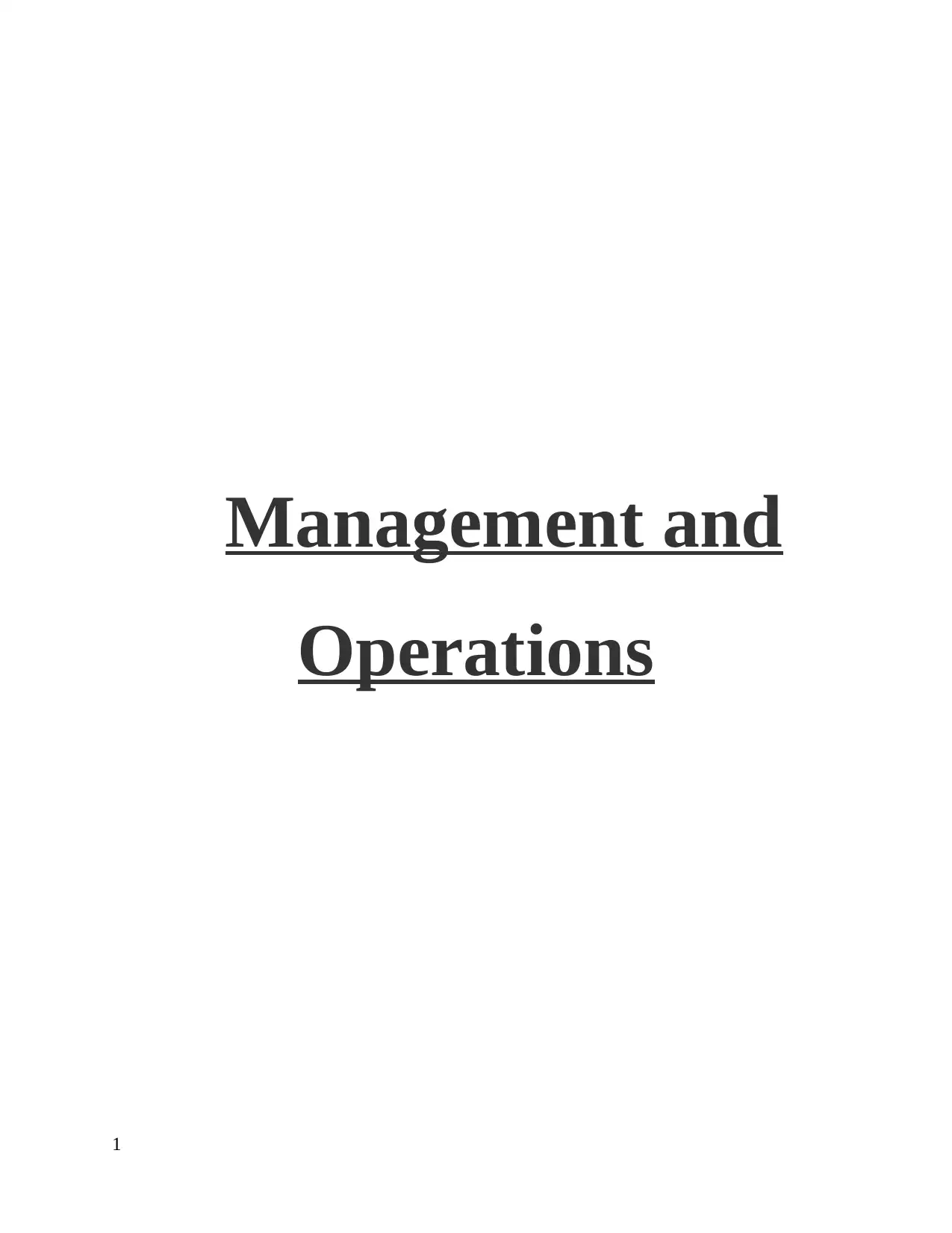
Management and
Operations
1
Operations
1
Paraphrase This Document
Need a fresh take? Get an instant paraphrase of this document with our AI Paraphraser
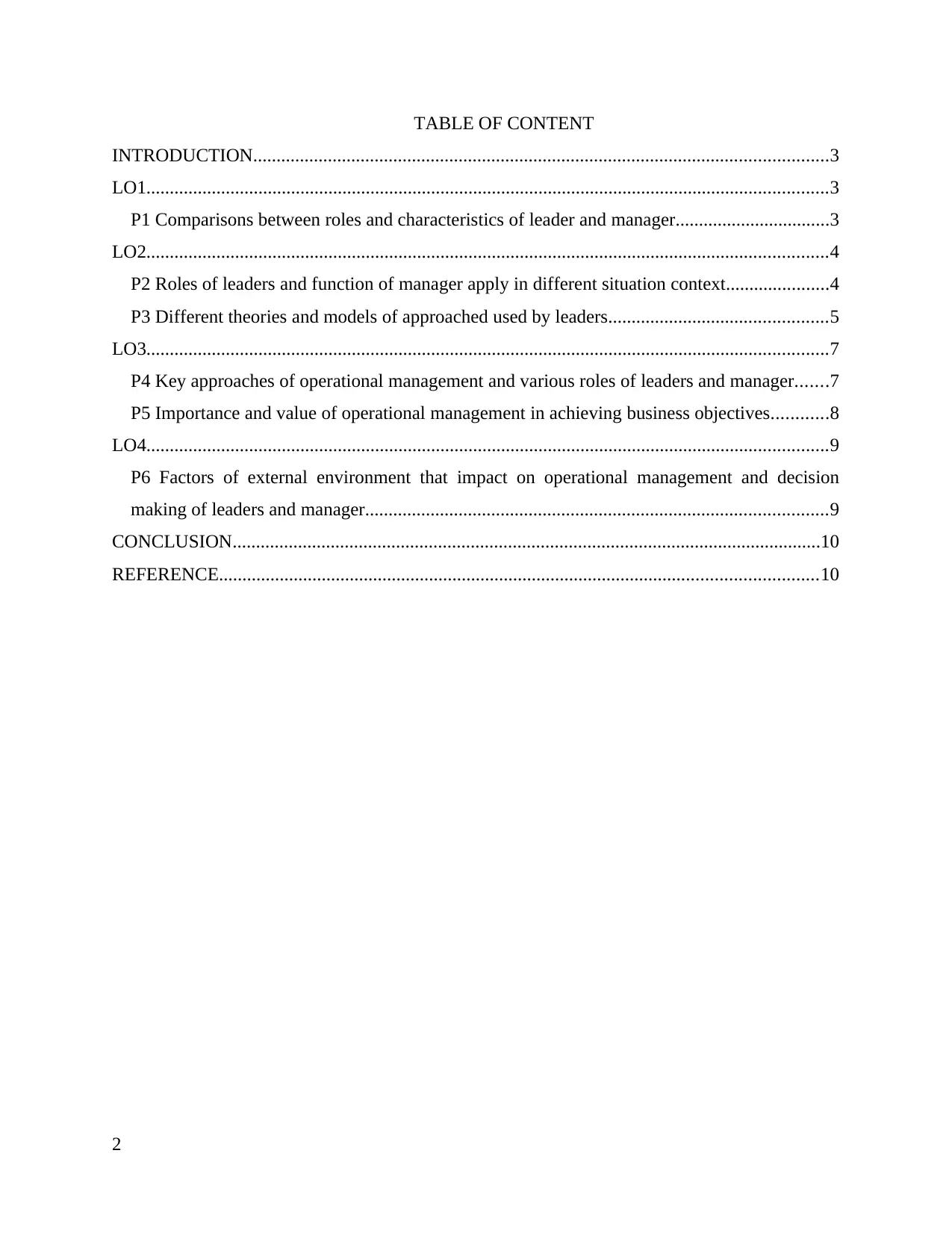
TABLE OF CONTENT
INTRODUCTION...........................................................................................................................3
LO1..................................................................................................................................................3
P1 Comparisons between roles and characteristics of leader and manager.................................3
LO2..................................................................................................................................................4
P2 Roles of leaders and function of manager apply in different situation context......................4
P3 Different theories and models of approached used by leaders...............................................5
LO3..................................................................................................................................................7
P4 Key approaches of operational management and various roles of leaders and manager.......7
P5 Importance and value of operational management in achieving business objectives............8
LO4..................................................................................................................................................9
P6 Factors of external environment that impact on operational management and decision
making of leaders and manager...................................................................................................9
CONCLUSION..............................................................................................................................10
REFERENCE................................................................................................................................10
2
INTRODUCTION...........................................................................................................................3
LO1..................................................................................................................................................3
P1 Comparisons between roles and characteristics of leader and manager.................................3
LO2..................................................................................................................................................4
P2 Roles of leaders and function of manager apply in different situation context......................4
P3 Different theories and models of approached used by leaders...............................................5
LO3..................................................................................................................................................7
P4 Key approaches of operational management and various roles of leaders and manager.......7
P5 Importance and value of operational management in achieving business objectives............8
LO4..................................................................................................................................................9
P6 Factors of external environment that impact on operational management and decision
making of leaders and manager...................................................................................................9
CONCLUSION..............................................................................................................................10
REFERENCE................................................................................................................................10
2
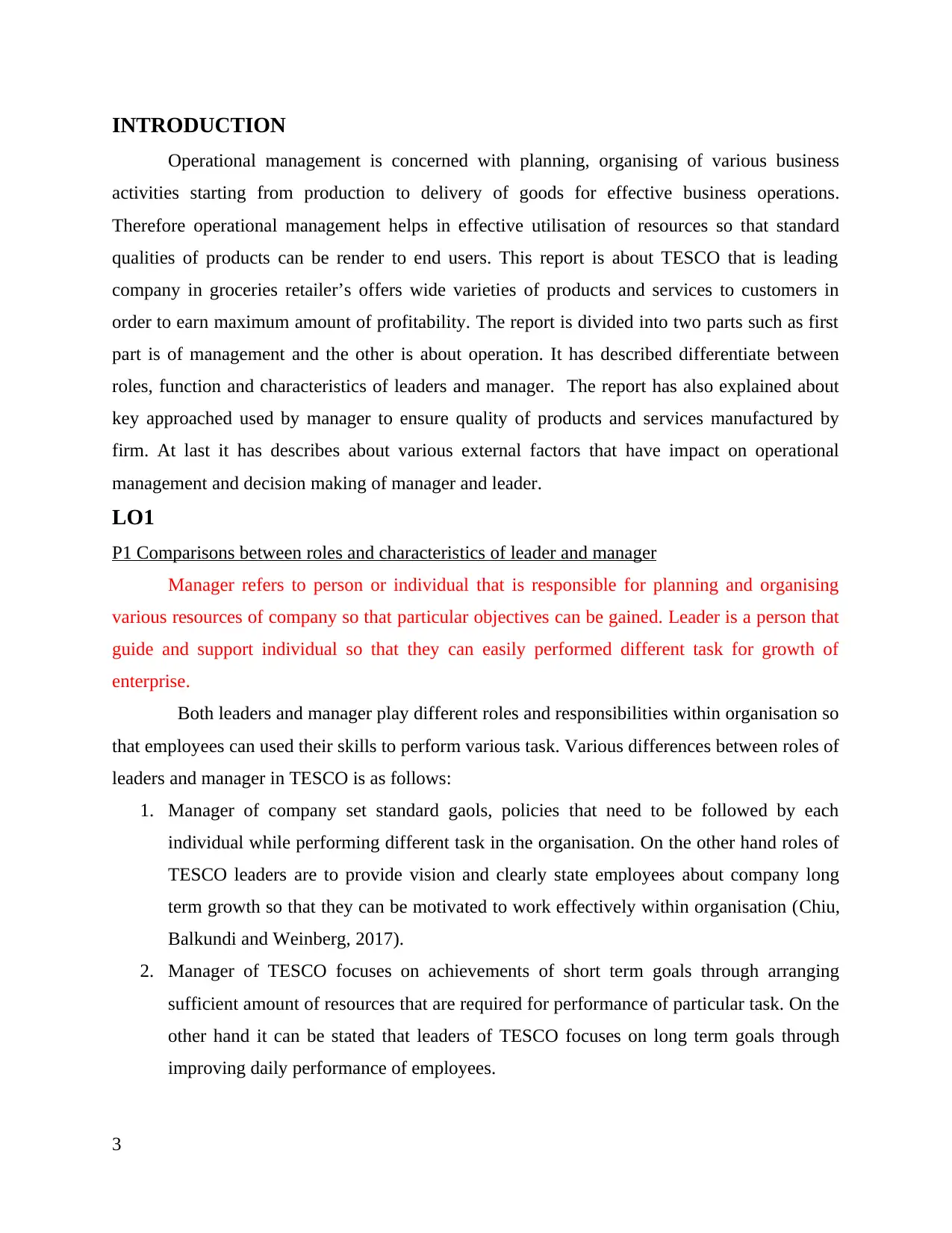
INTRODUCTION
Operational management is concerned with planning, organising of various business
activities starting from production to delivery of goods for effective business operations.
Therefore operational management helps in effective utilisation of resources so that standard
qualities of products can be render to end users. This report is about TESCO that is leading
company in groceries retailer’s offers wide varieties of products and services to customers in
order to earn maximum amount of profitability. The report is divided into two parts such as first
part is of management and the other is about operation. It has described differentiate between
roles, function and characteristics of leaders and manager. The report has also explained about
key approached used by manager to ensure quality of products and services manufactured by
firm. At last it has describes about various external factors that have impact on operational
management and decision making of manager and leader.
LO1
P1 Comparisons between roles and characteristics of leader and manager
Manager refers to person or individual that is responsible for planning and organising
various resources of company so that particular objectives can be gained. Leader is a person that
guide and support individual so that they can easily performed different task for growth of
enterprise.
Both leaders and manager play different roles and responsibilities within organisation so
that employees can used their skills to perform various task. Various differences between roles of
leaders and manager in TESCO is as follows:
1. Manager of company set standard gaols, policies that need to be followed by each
individual while performing different task in the organisation. On the other hand roles of
TESCO leaders are to provide vision and clearly state employees about company long
term growth so that they can be motivated to work effectively within organisation (Chiu,
Balkundi and Weinberg, 2017).
2. Manager of TESCO focuses on achievements of short term goals through arranging
sufficient amount of resources that are required for performance of particular task. On the
other hand it can be stated that leaders of TESCO focuses on long term goals through
improving daily performance of employees.
3
Operational management is concerned with planning, organising of various business
activities starting from production to delivery of goods for effective business operations.
Therefore operational management helps in effective utilisation of resources so that standard
qualities of products can be render to end users. This report is about TESCO that is leading
company in groceries retailer’s offers wide varieties of products and services to customers in
order to earn maximum amount of profitability. The report is divided into two parts such as first
part is of management and the other is about operation. It has described differentiate between
roles, function and characteristics of leaders and manager. The report has also explained about
key approached used by manager to ensure quality of products and services manufactured by
firm. At last it has describes about various external factors that have impact on operational
management and decision making of manager and leader.
LO1
P1 Comparisons between roles and characteristics of leader and manager
Manager refers to person or individual that is responsible for planning and organising
various resources of company so that particular objectives can be gained. Leader is a person that
guide and support individual so that they can easily performed different task for growth of
enterprise.
Both leaders and manager play different roles and responsibilities within organisation so
that employees can used their skills to perform various task. Various differences between roles of
leaders and manager in TESCO is as follows:
1. Manager of company set standard gaols, policies that need to be followed by each
individual while performing different task in the organisation. On the other hand roles of
TESCO leaders are to provide vision and clearly state employees about company long
term growth so that they can be motivated to work effectively within organisation (Chiu,
Balkundi and Weinberg, 2017).
2. Manager of TESCO focuses on achievements of short term goals through arranging
sufficient amount of resources that are required for performance of particular task. On the
other hand it can be stated that leaders of TESCO focuses on long term goals through
improving daily performance of employees.
3
⊘ This is a preview!⊘
Do you want full access?
Subscribe today to unlock all pages.

Trusted by 1+ million students worldwide
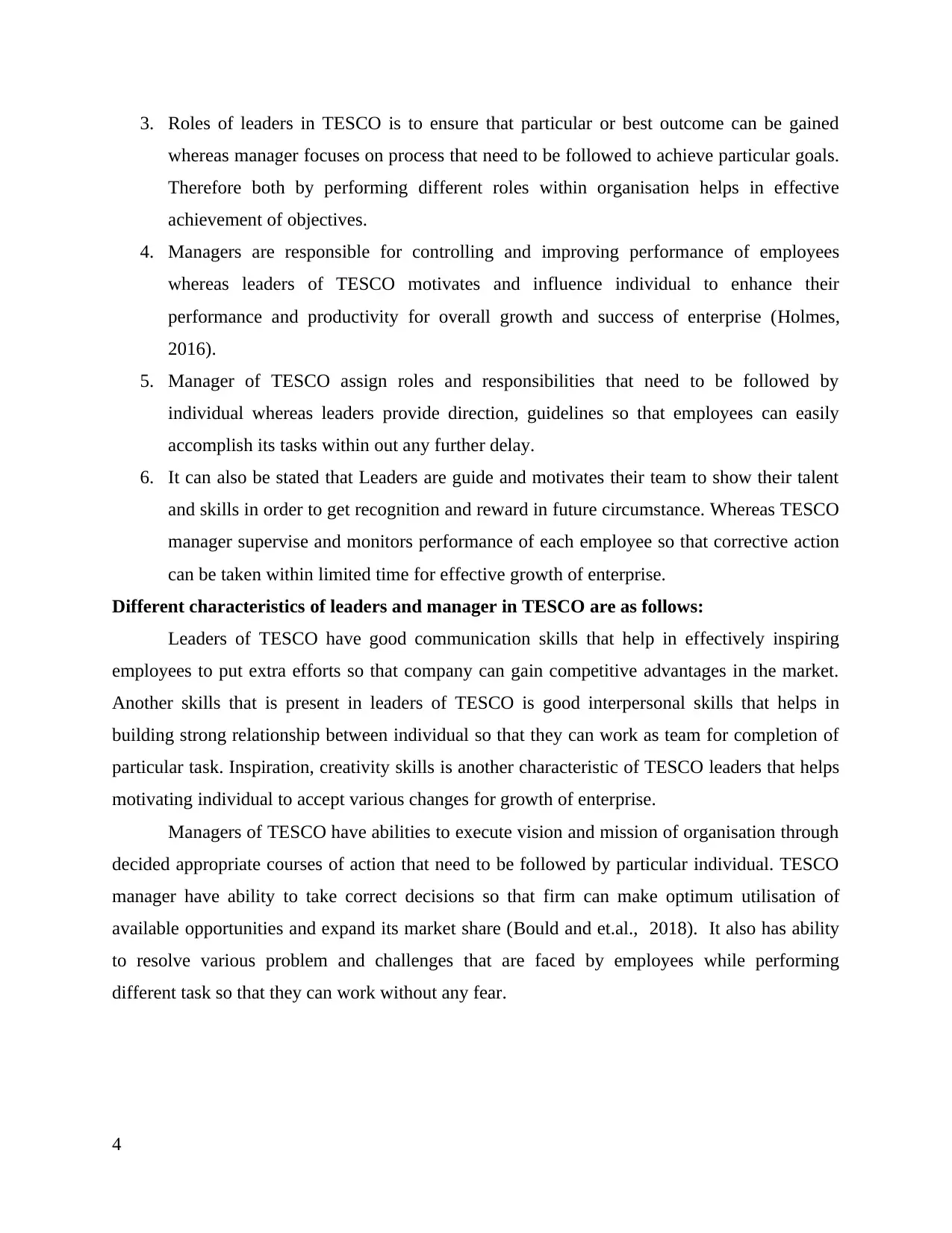
3. Roles of leaders in TESCO is to ensure that particular or best outcome can be gained
whereas manager focuses on process that need to be followed to achieve particular goals.
Therefore both by performing different roles within organisation helps in effective
achievement of objectives.
4. Managers are responsible for controlling and improving performance of employees
whereas leaders of TESCO motivates and influence individual to enhance their
performance and productivity for overall growth and success of enterprise (Holmes,
2016).
5. Manager of TESCO assign roles and responsibilities that need to be followed by
individual whereas leaders provide direction, guidelines so that employees can easily
accomplish its tasks within out any further delay.
6. It can also be stated that Leaders are guide and motivates their team to show their talent
and skills in order to get recognition and reward in future circumstance. Whereas TESCO
manager supervise and monitors performance of each employee so that corrective action
can be taken within limited time for effective growth of enterprise.
Different characteristics of leaders and manager in TESCO are as follows:
Leaders of TESCO have good communication skills that help in effectively inspiring
employees to put extra efforts so that company can gain competitive advantages in the market.
Another skills that is present in leaders of TESCO is good interpersonal skills that helps in
building strong relationship between individual so that they can work as team for completion of
particular task. Inspiration, creativity skills is another characteristic of TESCO leaders that helps
motivating individual to accept various changes for growth of enterprise.
Managers of TESCO have abilities to execute vision and mission of organisation through
decided appropriate courses of action that need to be followed by particular individual. TESCO
manager have ability to take correct decisions so that firm can make optimum utilisation of
available opportunities and expand its market share (Bould and et.al., 2018). It also has ability
to resolve various problem and challenges that are faced by employees while performing
different task so that they can work without any fear.
4
whereas manager focuses on process that need to be followed to achieve particular goals.
Therefore both by performing different roles within organisation helps in effective
achievement of objectives.
4. Managers are responsible for controlling and improving performance of employees
whereas leaders of TESCO motivates and influence individual to enhance their
performance and productivity for overall growth and success of enterprise (Holmes,
2016).
5. Manager of TESCO assign roles and responsibilities that need to be followed by
individual whereas leaders provide direction, guidelines so that employees can easily
accomplish its tasks within out any further delay.
6. It can also be stated that Leaders are guide and motivates their team to show their talent
and skills in order to get recognition and reward in future circumstance. Whereas TESCO
manager supervise and monitors performance of each employee so that corrective action
can be taken within limited time for effective growth of enterprise.
Different characteristics of leaders and manager in TESCO are as follows:
Leaders of TESCO have good communication skills that help in effectively inspiring
employees to put extra efforts so that company can gain competitive advantages in the market.
Another skills that is present in leaders of TESCO is good interpersonal skills that helps in
building strong relationship between individual so that they can work as team for completion of
particular task. Inspiration, creativity skills is another characteristic of TESCO leaders that helps
motivating individual to accept various changes for growth of enterprise.
Managers of TESCO have abilities to execute vision and mission of organisation through
decided appropriate courses of action that need to be followed by particular individual. TESCO
manager have ability to take correct decisions so that firm can make optimum utilisation of
available opportunities and expand its market share (Bould and et.al., 2018). It also has ability
to resolve various problem and challenges that are faced by employees while performing
different task so that they can work without any fear.
4
Paraphrase This Document
Need a fresh take? Get an instant paraphrase of this document with our AI Paraphraser
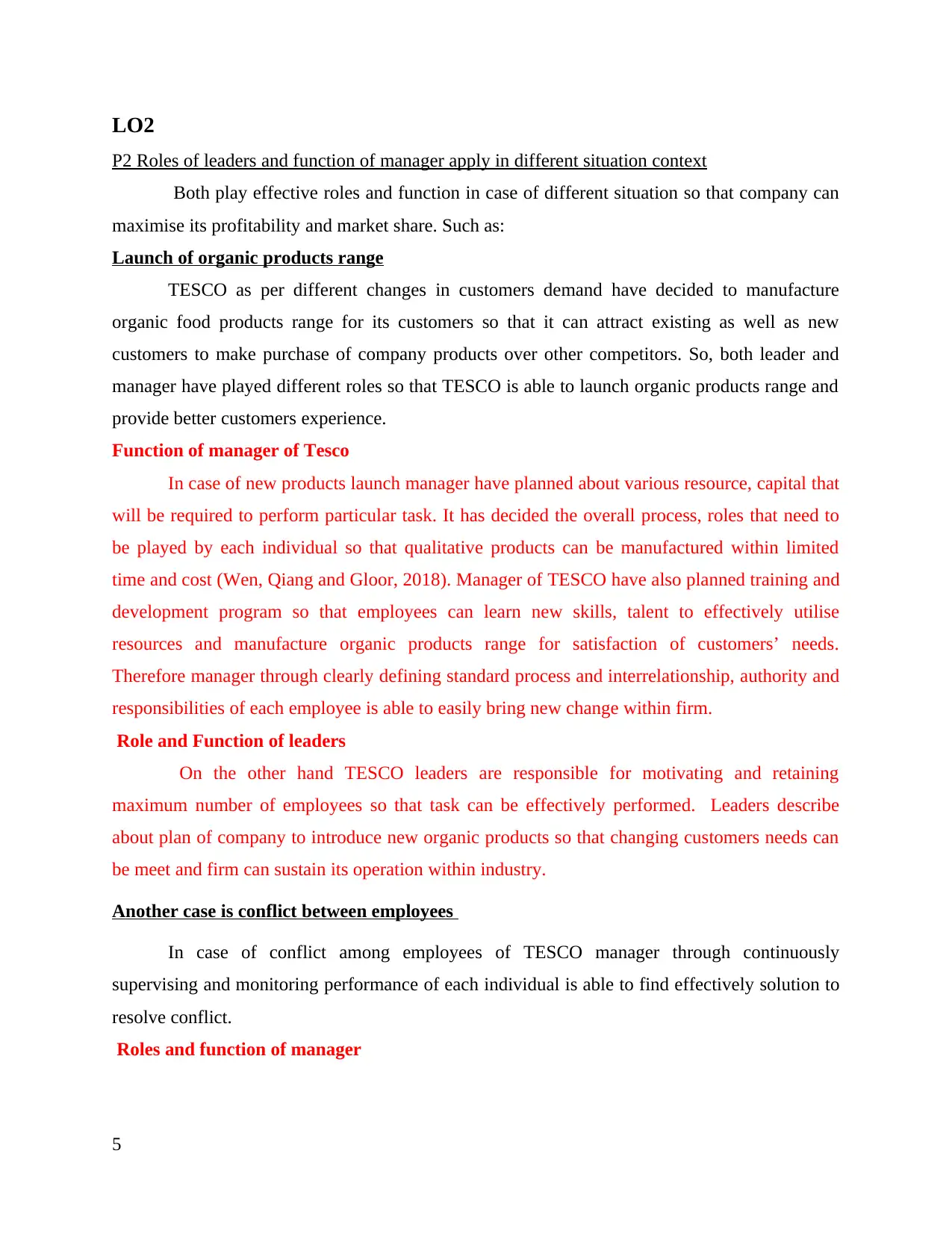
LO2
P2 Roles of leaders and function of manager apply in different situation context
Both play effective roles and function in case of different situation so that company can
maximise its profitability and market share. Such as:
Launch of organic products range
TESCO as per different changes in customers demand have decided to manufacture
organic food products range for its customers so that it can attract existing as well as new
customers to make purchase of company products over other competitors. So, both leader and
manager have played different roles so that TESCO is able to launch organic products range and
provide better customers experience.
Function of manager of Tesco
In case of new products launch manager have planned about various resource, capital that
will be required to perform particular task. It has decided the overall process, roles that need to
be played by each individual so that qualitative products can be manufactured within limited
time and cost (Wen, Qiang and Gloor, 2018). Manager of TESCO have also planned training and
development program so that employees can learn new skills, talent to effectively utilise
resources and manufacture organic products range for satisfaction of customers’ needs.
Therefore manager through clearly defining standard process and interrelationship, authority and
responsibilities of each employee is able to easily bring new change within firm.
Role and Function of leaders
On the other hand TESCO leaders are responsible for motivating and retaining
maximum number of employees so that task can be effectively performed. Leaders describe
about plan of company to introduce new organic products so that changing customers needs can
be meet and firm can sustain its operation within industry.
Another case is conflict between employees
In case of conflict among employees of TESCO manager through continuously
supervising and monitoring performance of each individual is able to find effectively solution to
resolve conflict.
Roles and function of manager
5
P2 Roles of leaders and function of manager apply in different situation context
Both play effective roles and function in case of different situation so that company can
maximise its profitability and market share. Such as:
Launch of organic products range
TESCO as per different changes in customers demand have decided to manufacture
organic food products range for its customers so that it can attract existing as well as new
customers to make purchase of company products over other competitors. So, both leader and
manager have played different roles so that TESCO is able to launch organic products range and
provide better customers experience.
Function of manager of Tesco
In case of new products launch manager have planned about various resource, capital that
will be required to perform particular task. It has decided the overall process, roles that need to
be played by each individual so that qualitative products can be manufactured within limited
time and cost (Wen, Qiang and Gloor, 2018). Manager of TESCO have also planned training and
development program so that employees can learn new skills, talent to effectively utilise
resources and manufacture organic products range for satisfaction of customers’ needs.
Therefore manager through clearly defining standard process and interrelationship, authority and
responsibilities of each employee is able to easily bring new change within firm.
Role and Function of leaders
On the other hand TESCO leaders are responsible for motivating and retaining
maximum number of employees so that task can be effectively performed. Leaders describe
about plan of company to introduce new organic products so that changing customers needs can
be meet and firm can sustain its operation within industry.
Another case is conflict between employees
In case of conflict among employees of TESCO manager through continuously
supervising and monitoring performance of each individual is able to find effectively solution to
resolve conflict.
Roles and function of manager
5
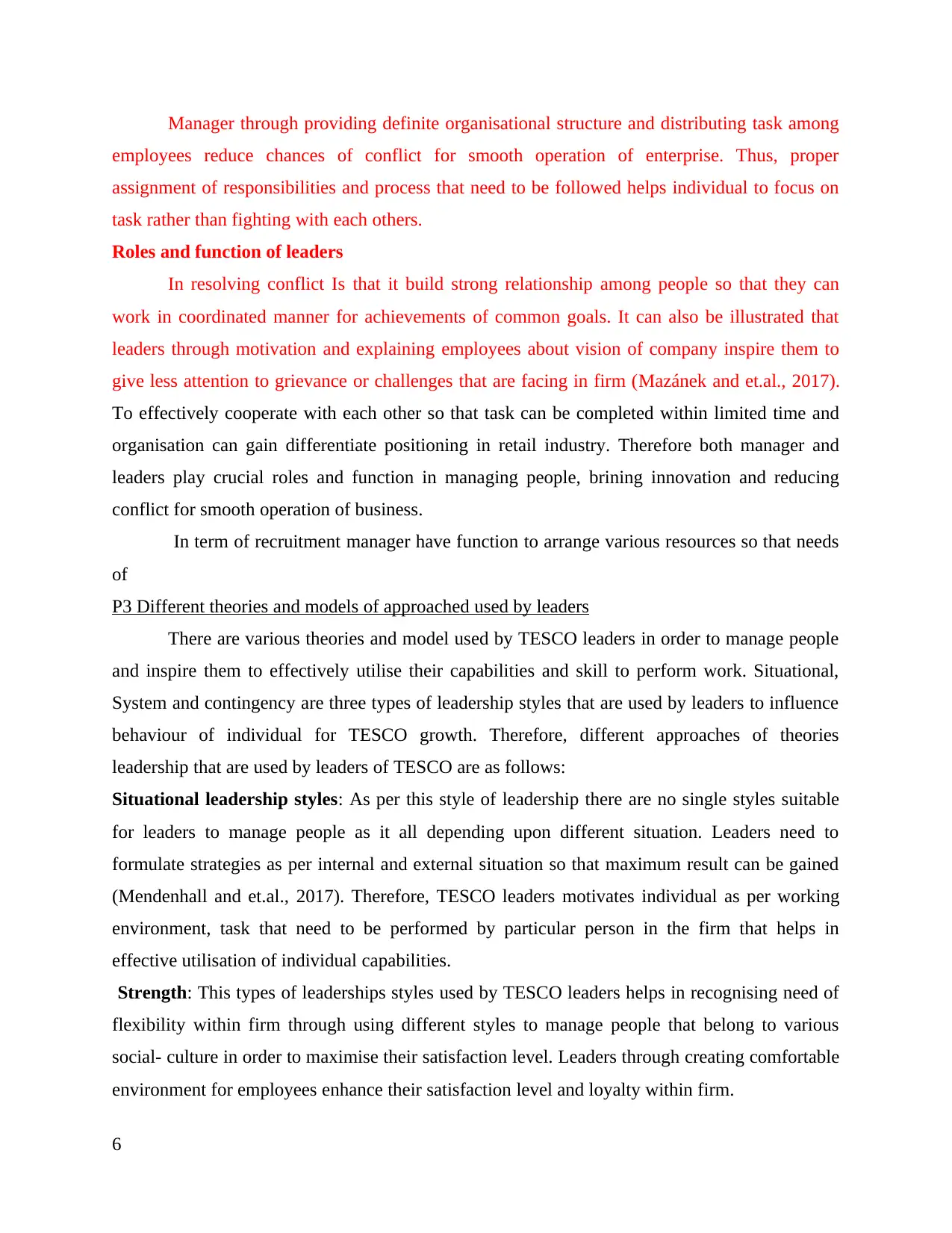
Manager through providing definite organisational structure and distributing task among
employees reduce chances of conflict for smooth operation of enterprise. Thus, proper
assignment of responsibilities and process that need to be followed helps individual to focus on
task rather than fighting with each others.
Roles and function of leaders
In resolving conflict Is that it build strong relationship among people so that they can
work in coordinated manner for achievements of common goals. It can also be illustrated that
leaders through motivation and explaining employees about vision of company inspire them to
give less attention to grievance or challenges that are facing in firm (Mazánek and et.al., 2017).
To effectively cooperate with each other so that task can be completed within limited time and
organisation can gain differentiate positioning in retail industry. Therefore both manager and
leaders play crucial roles and function in managing people, brining innovation and reducing
conflict for smooth operation of business.
In term of recruitment manager have function to arrange various resources so that needs
of
P3 Different theories and models of approached used by leaders
There are various theories and model used by TESCO leaders in order to manage people
and inspire them to effectively utilise their capabilities and skill to perform work. Situational,
System and contingency are three types of leadership styles that are used by leaders to influence
behaviour of individual for TESCO growth. Therefore, different approaches of theories
leadership that are used by leaders of TESCO are as follows:
Situational leadership styles: As per this style of leadership there are no single styles suitable
for leaders to manage people as it all depending upon different situation. Leaders need to
formulate strategies as per internal and external situation so that maximum result can be gained
(Mendenhall and et.al., 2017). Therefore, TESCO leaders motivates individual as per working
environment, task that need to be performed by particular person in the firm that helps in
effective utilisation of individual capabilities.
Strength: This types of leaderships styles used by TESCO leaders helps in recognising need of
flexibility within firm through using different styles to manage people that belong to various
social- culture in order to maximise their satisfaction level. Leaders through creating comfortable
environment for employees enhance their satisfaction level and loyalty within firm.
6
employees reduce chances of conflict for smooth operation of enterprise. Thus, proper
assignment of responsibilities and process that need to be followed helps individual to focus on
task rather than fighting with each others.
Roles and function of leaders
In resolving conflict Is that it build strong relationship among people so that they can
work in coordinated manner for achievements of common goals. It can also be illustrated that
leaders through motivation and explaining employees about vision of company inspire them to
give less attention to grievance or challenges that are facing in firm (Mazánek and et.al., 2017).
To effectively cooperate with each other so that task can be completed within limited time and
organisation can gain differentiate positioning in retail industry. Therefore both manager and
leaders play crucial roles and function in managing people, brining innovation and reducing
conflict for smooth operation of business.
In term of recruitment manager have function to arrange various resources so that needs
of
P3 Different theories and models of approached used by leaders
There are various theories and model used by TESCO leaders in order to manage people
and inspire them to effectively utilise their capabilities and skill to perform work. Situational,
System and contingency are three types of leadership styles that are used by leaders to influence
behaviour of individual for TESCO growth. Therefore, different approaches of theories
leadership that are used by leaders of TESCO are as follows:
Situational leadership styles: As per this style of leadership there are no single styles suitable
for leaders to manage people as it all depending upon different situation. Leaders need to
formulate strategies as per internal and external situation so that maximum result can be gained
(Mendenhall and et.al., 2017). Therefore, TESCO leaders motivates individual as per working
environment, task that need to be performed by particular person in the firm that helps in
effective utilisation of individual capabilities.
Strength: This types of leaderships styles used by TESCO leaders helps in recognising need of
flexibility within firm through using different styles to manage people that belong to various
social- culture in order to maximise their satisfaction level. Leaders through creating comfortable
environment for employees enhance their satisfaction level and loyalty within firm.
6
⊘ This is a preview!⊘
Do you want full access?
Subscribe today to unlock all pages.

Trusted by 1+ million students worldwide
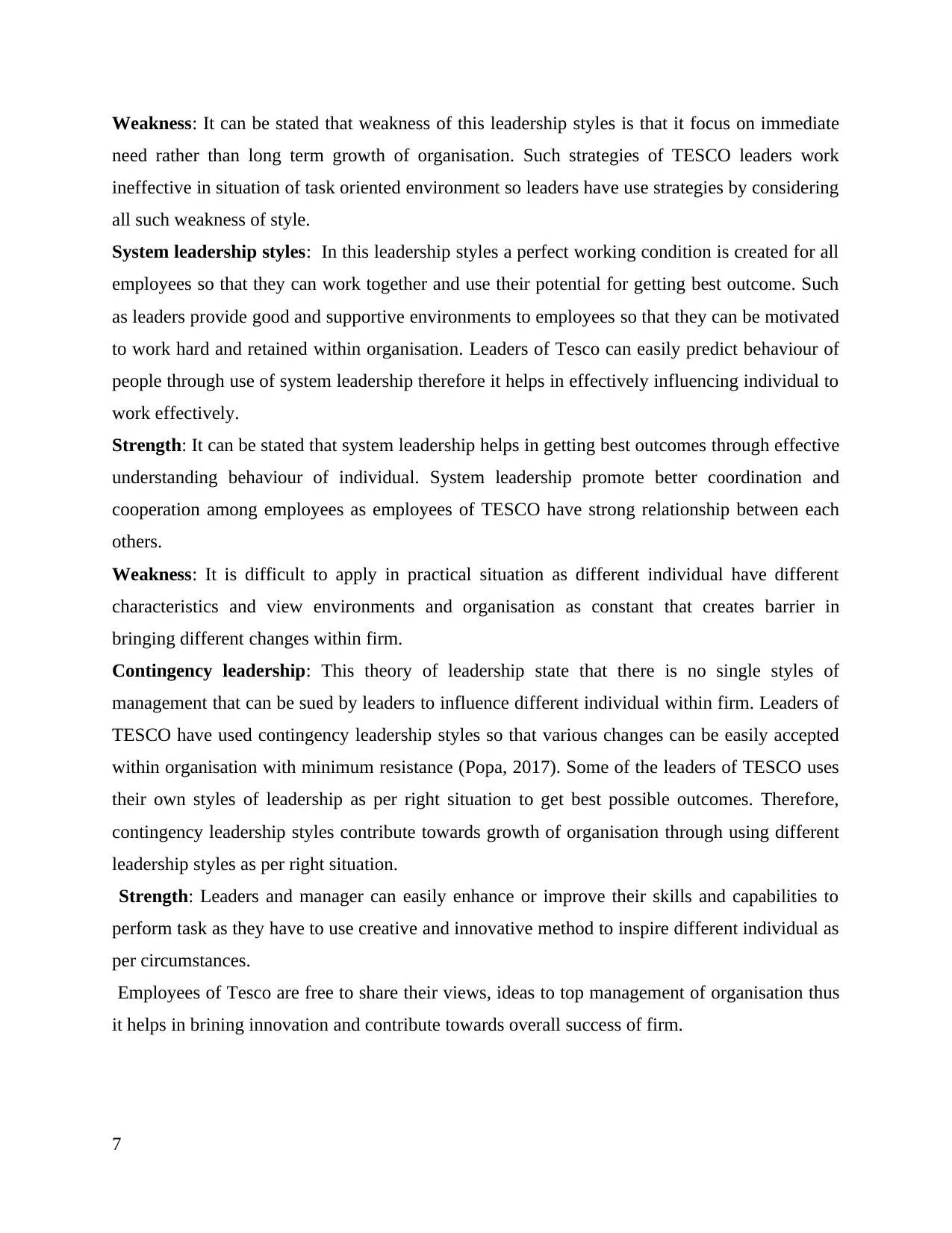
Weakness: It can be stated that weakness of this leadership styles is that it focus on immediate
need rather than long term growth of organisation. Such strategies of TESCO leaders work
ineffective in situation of task oriented environment so leaders have use strategies by considering
all such weakness of style.
System leadership styles: In this leadership styles a perfect working condition is created for all
employees so that they can work together and use their potential for getting best outcome. Such
as leaders provide good and supportive environments to employees so that they can be motivated
to work hard and retained within organisation. Leaders of Tesco can easily predict behaviour of
people through use of system leadership therefore it helps in effectively influencing individual to
work effectively.
Strength: It can be stated that system leadership helps in getting best outcomes through effective
understanding behaviour of individual. System leadership promote better coordination and
cooperation among employees as employees of TESCO have strong relationship between each
others.
Weakness: It is difficult to apply in practical situation as different individual have different
characteristics and view environments and organisation as constant that creates barrier in
bringing different changes within firm.
Contingency leadership: This theory of leadership state that there is no single styles of
management that can be sued by leaders to influence different individual within firm. Leaders of
TESCO have used contingency leadership styles so that various changes can be easily accepted
within organisation with minimum resistance (Popa, 2017). Some of the leaders of TESCO uses
their own styles of leadership as per right situation to get best possible outcomes. Therefore,
contingency leadership styles contribute towards growth of organisation through using different
leadership styles as per right situation.
Strength: Leaders and manager can easily enhance or improve their skills and capabilities to
perform task as they have to use creative and innovative method to inspire different individual as
per circumstances.
Employees of Tesco are free to share their views, ideas to top management of organisation thus
it helps in brining innovation and contribute towards overall success of firm.
7
need rather than long term growth of organisation. Such strategies of TESCO leaders work
ineffective in situation of task oriented environment so leaders have use strategies by considering
all such weakness of style.
System leadership styles: In this leadership styles a perfect working condition is created for all
employees so that they can work together and use their potential for getting best outcome. Such
as leaders provide good and supportive environments to employees so that they can be motivated
to work hard and retained within organisation. Leaders of Tesco can easily predict behaviour of
people through use of system leadership therefore it helps in effectively influencing individual to
work effectively.
Strength: It can be stated that system leadership helps in getting best outcomes through effective
understanding behaviour of individual. System leadership promote better coordination and
cooperation among employees as employees of TESCO have strong relationship between each
others.
Weakness: It is difficult to apply in practical situation as different individual have different
characteristics and view environments and organisation as constant that creates barrier in
bringing different changes within firm.
Contingency leadership: This theory of leadership state that there is no single styles of
management that can be sued by leaders to influence different individual within firm. Leaders of
TESCO have used contingency leadership styles so that various changes can be easily accepted
within organisation with minimum resistance (Popa, 2017). Some of the leaders of TESCO uses
their own styles of leadership as per right situation to get best possible outcomes. Therefore,
contingency leadership styles contribute towards growth of organisation through using different
leadership styles as per right situation.
Strength: Leaders and manager can easily enhance or improve their skills and capabilities to
perform task as they have to use creative and innovative method to inspire different individual as
per circumstances.
Employees of Tesco are free to share their views, ideas to top management of organisation thus
it helps in brining innovation and contribute towards overall success of firm.
7
Paraphrase This Document
Need a fresh take? Get an instant paraphrase of this document with our AI Paraphraser
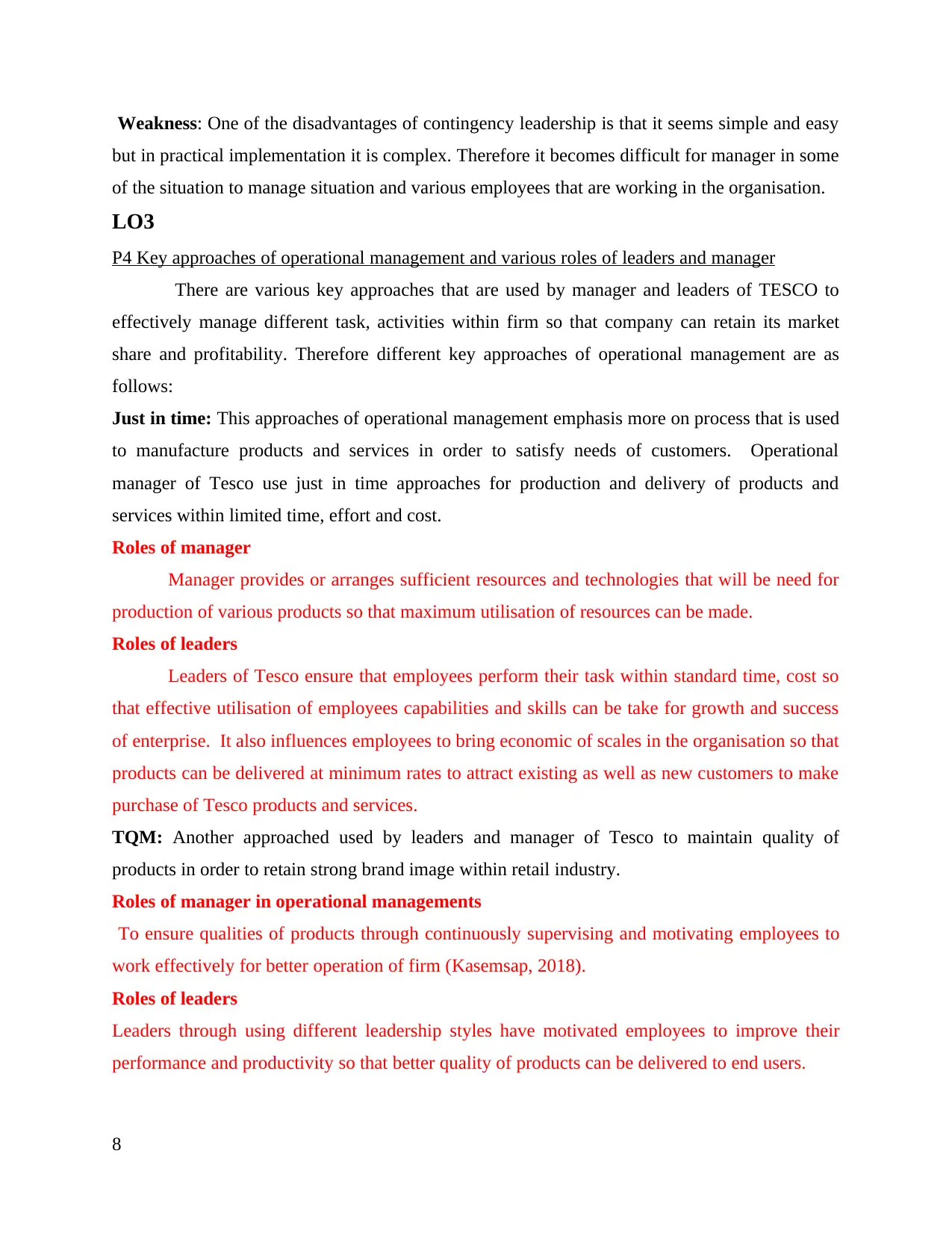
Weakness: One of the disadvantages of contingency leadership is that it seems simple and easy
but in practical implementation it is complex. Therefore it becomes difficult for manager in some
of the situation to manage situation and various employees that are working in the organisation.
LO3
P4 Key approaches of operational management and various roles of leaders and manager
There are various key approaches that are used by manager and leaders of TESCO to
effectively manage different task, activities within firm so that company can retain its market
share and profitability. Therefore different key approaches of operational management are as
follows:
Just in time: This approaches of operational management emphasis more on process that is used
to manufacture products and services in order to satisfy needs of customers. Operational
manager of Tesco use just in time approaches for production and delivery of products and
services within limited time, effort and cost.
Roles of manager
Manager provides or arranges sufficient resources and technologies that will be need for
production of various products so that maximum utilisation of resources can be made.
Roles of leaders
Leaders of Tesco ensure that employees perform their task within standard time, cost so
that effective utilisation of employees capabilities and skills can be take for growth and success
of enterprise. It also influences employees to bring economic of scales in the organisation so that
products can be delivered at minimum rates to attract existing as well as new customers to make
purchase of Tesco products and services.
TQM: Another approached used by leaders and manager of Tesco to maintain quality of
products in order to retain strong brand image within retail industry.
Roles of manager in operational managements
To ensure qualities of products through continuously supervising and motivating employees to
work effectively for better operation of firm (Kasemsap, 2018).
Roles of leaders
Leaders through using different leadership styles have motivated employees to improve their
performance and productivity so that better quality of products can be delivered to end users.
8
but in practical implementation it is complex. Therefore it becomes difficult for manager in some
of the situation to manage situation and various employees that are working in the organisation.
LO3
P4 Key approaches of operational management and various roles of leaders and manager
There are various key approaches that are used by manager and leaders of TESCO to
effectively manage different task, activities within firm so that company can retain its market
share and profitability. Therefore different key approaches of operational management are as
follows:
Just in time: This approaches of operational management emphasis more on process that is used
to manufacture products and services in order to satisfy needs of customers. Operational
manager of Tesco use just in time approaches for production and delivery of products and
services within limited time, effort and cost.
Roles of manager
Manager provides or arranges sufficient resources and technologies that will be need for
production of various products so that maximum utilisation of resources can be made.
Roles of leaders
Leaders of Tesco ensure that employees perform their task within standard time, cost so
that effective utilisation of employees capabilities and skills can be take for growth and success
of enterprise. It also influences employees to bring economic of scales in the organisation so that
products can be delivered at minimum rates to attract existing as well as new customers to make
purchase of Tesco products and services.
TQM: Another approached used by leaders and manager of Tesco to maintain quality of
products in order to retain strong brand image within retail industry.
Roles of manager in operational managements
To ensure qualities of products through continuously supervising and motivating employees to
work effectively for better operation of firm (Kasemsap, 2018).
Roles of leaders
Leaders through using different leadership styles have motivated employees to improve their
performance and productivity so that better quality of products can be delivered to end users.
8
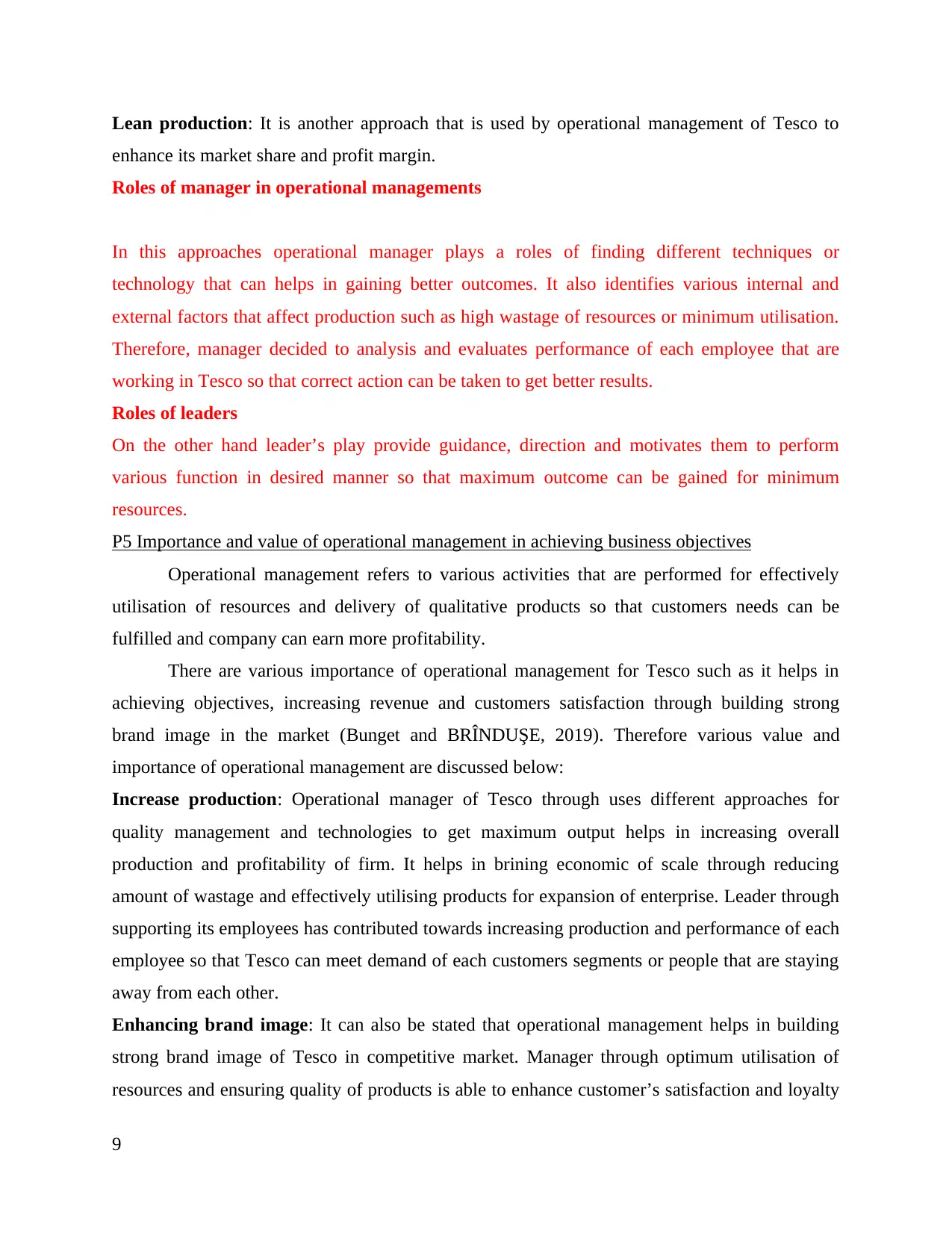
Lean production: It is another approach that is used by operational management of Tesco to
enhance its market share and profit margin.
Roles of manager in operational managements
In this approaches operational manager plays a roles of finding different techniques or
technology that can helps in gaining better outcomes. It also identifies various internal and
external factors that affect production such as high wastage of resources or minimum utilisation.
Therefore, manager decided to analysis and evaluates performance of each employee that are
working in Tesco so that correct action can be taken to get better results.
Roles of leaders
On the other hand leader’s play provide guidance, direction and motivates them to perform
various function in desired manner so that maximum outcome can be gained for minimum
resources.
P5 Importance and value of operational management in achieving business objectives
Operational management refers to various activities that are performed for effectively
utilisation of resources and delivery of qualitative products so that customers needs can be
fulfilled and company can earn more profitability.
There are various importance of operational management for Tesco such as it helps in
achieving objectives, increasing revenue and customers satisfaction through building strong
brand image in the market (Bunget and BRÎNDUŞE, 2019). Therefore various value and
importance of operational management are discussed below:
Increase production: Operational manager of Tesco through uses different approaches for
quality management and technologies to get maximum output helps in increasing overall
production and profitability of firm. It helps in brining economic of scale through reducing
amount of wastage and effectively utilising products for expansion of enterprise. Leader through
supporting its employees has contributed towards increasing production and performance of each
employee so that Tesco can meet demand of each customers segments or people that are staying
away from each other.
Enhancing brand image: It can also be stated that operational management helps in building
strong brand image of Tesco in competitive market. Manager through optimum utilisation of
resources and ensuring quality of products is able to enhance customer’s satisfaction and loyalty
9
enhance its market share and profit margin.
Roles of manager in operational managements
In this approaches operational manager plays a roles of finding different techniques or
technology that can helps in gaining better outcomes. It also identifies various internal and
external factors that affect production such as high wastage of resources or minimum utilisation.
Therefore, manager decided to analysis and evaluates performance of each employee that are
working in Tesco so that correct action can be taken to get better results.
Roles of leaders
On the other hand leader’s play provide guidance, direction and motivates them to perform
various function in desired manner so that maximum outcome can be gained for minimum
resources.
P5 Importance and value of operational management in achieving business objectives
Operational management refers to various activities that are performed for effectively
utilisation of resources and delivery of qualitative products so that customers needs can be
fulfilled and company can earn more profitability.
There are various importance of operational management for Tesco such as it helps in
achieving objectives, increasing revenue and customers satisfaction through building strong
brand image in the market (Bunget and BRÎNDUŞE, 2019). Therefore various value and
importance of operational management are discussed below:
Increase production: Operational manager of Tesco through uses different approaches for
quality management and technologies to get maximum output helps in increasing overall
production and profitability of firm. It helps in brining economic of scale through reducing
amount of wastage and effectively utilising products for expansion of enterprise. Leader through
supporting its employees has contributed towards increasing production and performance of each
employee so that Tesco can meet demand of each customers segments or people that are staying
away from each other.
Enhancing brand image: It can also be stated that operational management helps in building
strong brand image of Tesco in competitive market. Manager through optimum utilisation of
resources and ensuring quality of products is able to enhance customer’s satisfaction and loyalty
9
⊘ This is a preview!⊘
Do you want full access?
Subscribe today to unlock all pages.

Trusted by 1+ million students worldwide
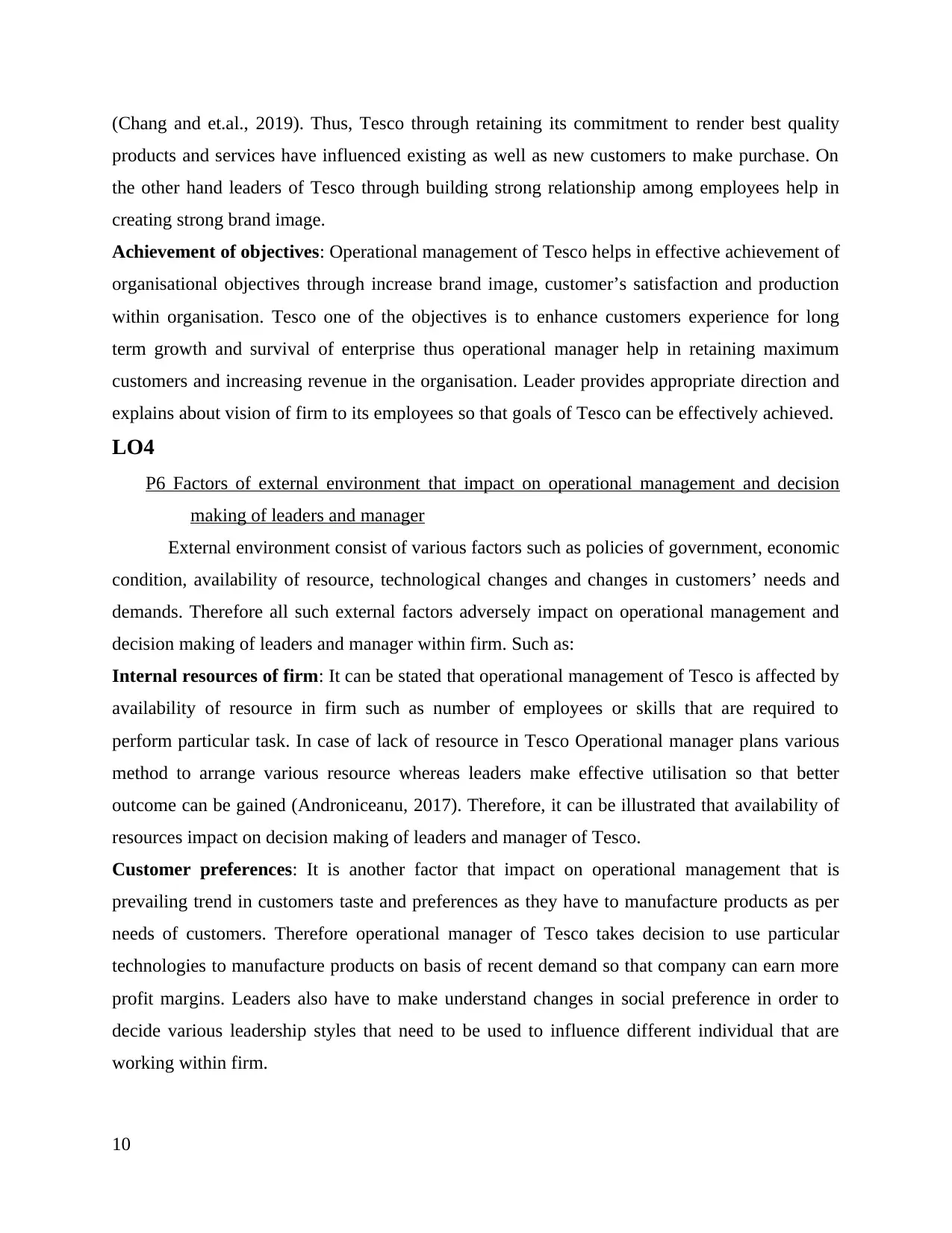
(Chang and et.al., 2019). Thus, Tesco through retaining its commitment to render best quality
products and services have influenced existing as well as new customers to make purchase. On
the other hand leaders of Tesco through building strong relationship among employees help in
creating strong brand image.
Achievement of objectives: Operational management of Tesco helps in effective achievement of
organisational objectives through increase brand image, customer’s satisfaction and production
within organisation. Tesco one of the objectives is to enhance customers experience for long
term growth and survival of enterprise thus operational manager help in retaining maximum
customers and increasing revenue in the organisation. Leader provides appropriate direction and
explains about vision of firm to its employees so that goals of Tesco can be effectively achieved.
LO4
P6 Factors of external environment that impact on operational management and decision
making of leaders and manager
External environment consist of various factors such as policies of government, economic
condition, availability of resource, technological changes and changes in customers’ needs and
demands. Therefore all such external factors adversely impact on operational management and
decision making of leaders and manager within firm. Such as:
Internal resources of firm: It can be stated that operational management of Tesco is affected by
availability of resource in firm such as number of employees or skills that are required to
perform particular task. In case of lack of resource in Tesco Operational manager plans various
method to arrange various resource whereas leaders make effective utilisation so that better
outcome can be gained (Androniceanu, 2017). Therefore, it can be illustrated that availability of
resources impact on decision making of leaders and manager of Tesco.
Customer preferences: It is another factor that impact on operational management that is
prevailing trend in customers taste and preferences as they have to manufacture products as per
needs of customers. Therefore operational manager of Tesco takes decision to use particular
technologies to manufacture products on basis of recent demand so that company can earn more
profit margins. Leaders also have to make understand changes in social preference in order to
decide various leadership styles that need to be used to influence different individual that are
working within firm.
10
products and services have influenced existing as well as new customers to make purchase. On
the other hand leaders of Tesco through building strong relationship among employees help in
creating strong brand image.
Achievement of objectives: Operational management of Tesco helps in effective achievement of
organisational objectives through increase brand image, customer’s satisfaction and production
within organisation. Tesco one of the objectives is to enhance customers experience for long
term growth and survival of enterprise thus operational manager help in retaining maximum
customers and increasing revenue in the organisation. Leader provides appropriate direction and
explains about vision of firm to its employees so that goals of Tesco can be effectively achieved.
LO4
P6 Factors of external environment that impact on operational management and decision
making of leaders and manager
External environment consist of various factors such as policies of government, economic
condition, availability of resource, technological changes and changes in customers’ needs and
demands. Therefore all such external factors adversely impact on operational management and
decision making of leaders and manager within firm. Such as:
Internal resources of firm: It can be stated that operational management of Tesco is affected by
availability of resource in firm such as number of employees or skills that are required to
perform particular task. In case of lack of resource in Tesco Operational manager plans various
method to arrange various resource whereas leaders make effective utilisation so that better
outcome can be gained (Androniceanu, 2017). Therefore, it can be illustrated that availability of
resources impact on decision making of leaders and manager of Tesco.
Customer preferences: It is another factor that impact on operational management that is
prevailing trend in customers taste and preferences as they have to manufacture products as per
needs of customers. Therefore operational manager of Tesco takes decision to use particular
technologies to manufacture products on basis of recent demand so that company can earn more
profit margins. Leaders also have to make understand changes in social preference in order to
decide various leadership styles that need to be used to influence different individual that are
working within firm.
10
Paraphrase This Document
Need a fresh take? Get an instant paraphrase of this document with our AI Paraphraser
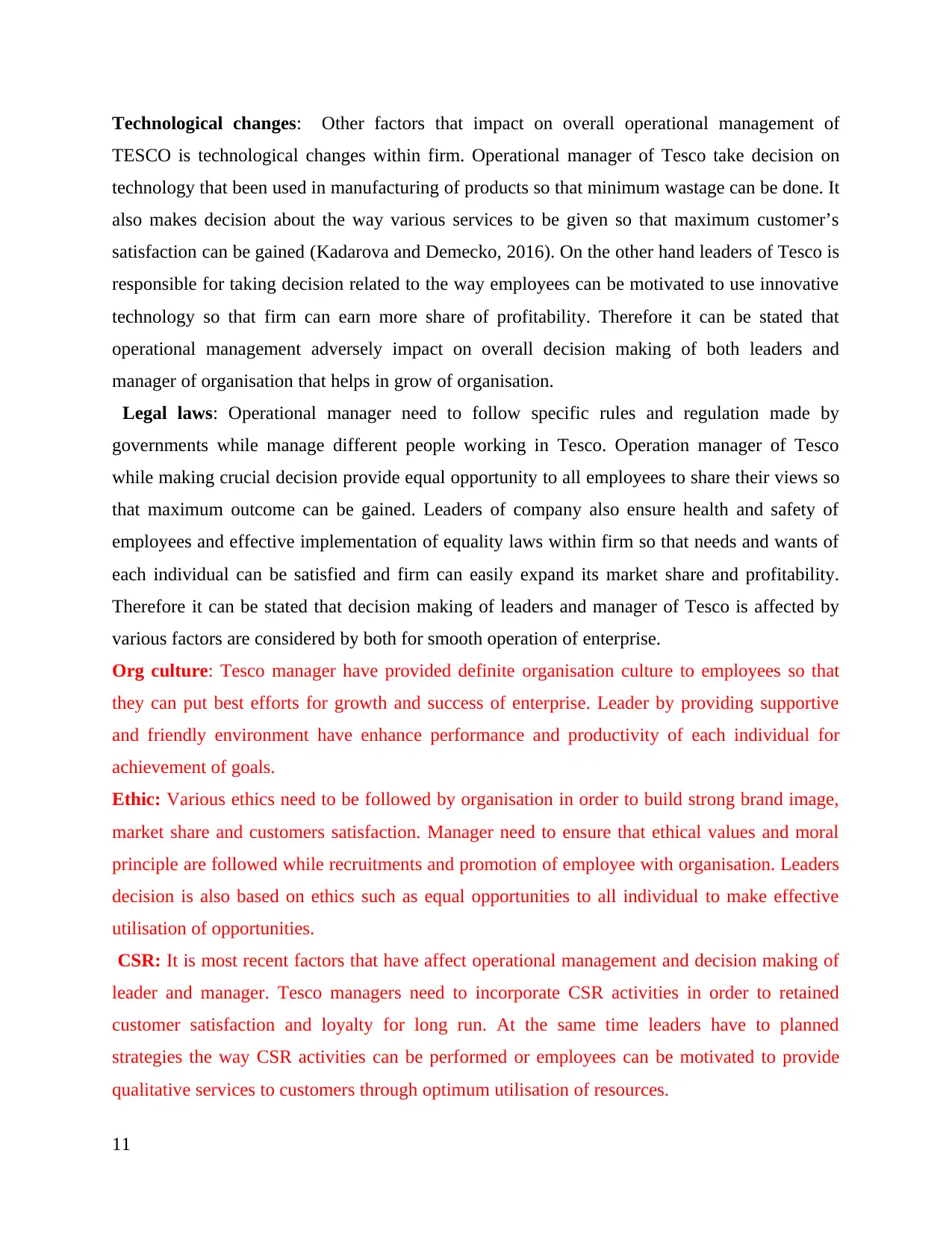
Technological changes: Other factors that impact on overall operational management of
TESCO is technological changes within firm. Operational manager of Tesco take decision on
technology that been used in manufacturing of products so that minimum wastage can be done. It
also makes decision about the way various services to be given so that maximum customer’s
satisfaction can be gained (Kadarova and Demecko, 2016). On the other hand leaders of Tesco is
responsible for taking decision related to the way employees can be motivated to use innovative
technology so that firm can earn more share of profitability. Therefore it can be stated that
operational management adversely impact on overall decision making of both leaders and
manager of organisation that helps in grow of organisation.
Legal laws: Operational manager need to follow specific rules and regulation made by
governments while manage different people working in Tesco. Operation manager of Tesco
while making crucial decision provide equal opportunity to all employees to share their views so
that maximum outcome can be gained. Leaders of company also ensure health and safety of
employees and effective implementation of equality laws within firm so that needs and wants of
each individual can be satisfied and firm can easily expand its market share and profitability.
Therefore it can be stated that decision making of leaders and manager of Tesco is affected by
various factors are considered by both for smooth operation of enterprise.
Org culture: Tesco manager have provided definite organisation culture to employees so that
they can put best efforts for growth and success of enterprise. Leader by providing supportive
and friendly environment have enhance performance and productivity of each individual for
achievement of goals.
Ethic: Various ethics need to be followed by organisation in order to build strong brand image,
market share and customers satisfaction. Manager need to ensure that ethical values and moral
principle are followed while recruitments and promotion of employee with organisation. Leaders
decision is also based on ethics such as equal opportunities to all individual to make effective
utilisation of opportunities.
CSR: It is most recent factors that have affect operational management and decision making of
leader and manager. Tesco managers need to incorporate CSR activities in order to retained
customer satisfaction and loyalty for long run. At the same time leaders have to planned
strategies the way CSR activities can be performed or employees can be motivated to provide
qualitative services to customers through optimum utilisation of resources.
11
TESCO is technological changes within firm. Operational manager of Tesco take decision on
technology that been used in manufacturing of products so that minimum wastage can be done. It
also makes decision about the way various services to be given so that maximum customer’s
satisfaction can be gained (Kadarova and Demecko, 2016). On the other hand leaders of Tesco is
responsible for taking decision related to the way employees can be motivated to use innovative
technology so that firm can earn more share of profitability. Therefore it can be stated that
operational management adversely impact on overall decision making of both leaders and
manager of organisation that helps in grow of organisation.
Legal laws: Operational manager need to follow specific rules and regulation made by
governments while manage different people working in Tesco. Operation manager of Tesco
while making crucial decision provide equal opportunity to all employees to share their views so
that maximum outcome can be gained. Leaders of company also ensure health and safety of
employees and effective implementation of equality laws within firm so that needs and wants of
each individual can be satisfied and firm can easily expand its market share and profitability.
Therefore it can be stated that decision making of leaders and manager of Tesco is affected by
various factors are considered by both for smooth operation of enterprise.
Org culture: Tesco manager have provided definite organisation culture to employees so that
they can put best efforts for growth and success of enterprise. Leader by providing supportive
and friendly environment have enhance performance and productivity of each individual for
achievement of goals.
Ethic: Various ethics need to be followed by organisation in order to build strong brand image,
market share and customers satisfaction. Manager need to ensure that ethical values and moral
principle are followed while recruitments and promotion of employee with organisation. Leaders
decision is also based on ethics such as equal opportunities to all individual to make effective
utilisation of opportunities.
CSR: It is most recent factors that have affect operational management and decision making of
leader and manager. Tesco managers need to incorporate CSR activities in order to retained
customer satisfaction and loyalty for long run. At the same time leaders have to planned
strategies the way CSR activities can be performed or employees can be motivated to provide
qualitative services to customers through optimum utilisation of resources.
11
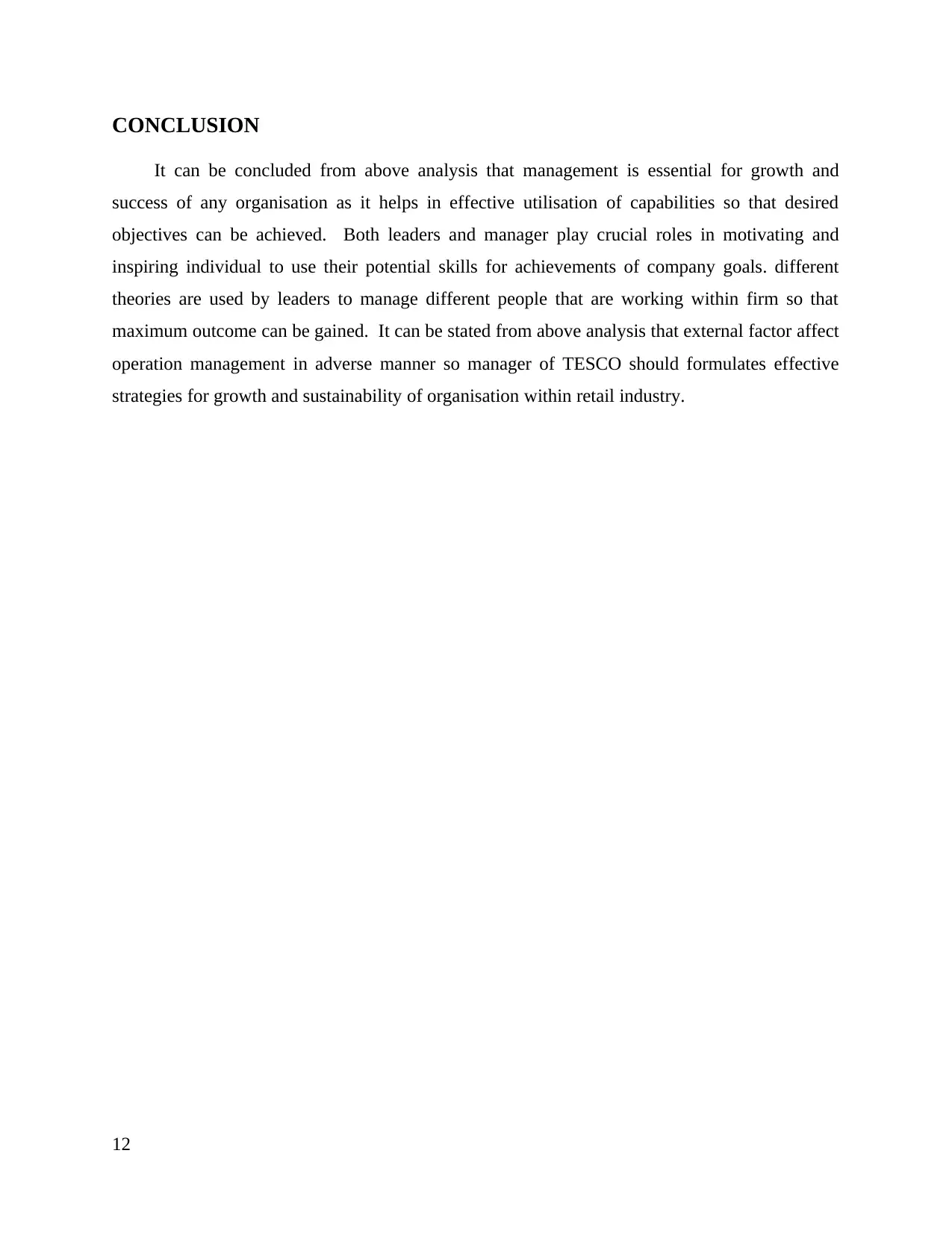
CONCLUSION
It can be concluded from above analysis that management is essential for growth and
success of any organisation as it helps in effective utilisation of capabilities so that desired
objectives can be achieved. Both leaders and manager play crucial roles in motivating and
inspiring individual to use their potential skills for achievements of company goals. different
theories are used by leaders to manage different people that are working within firm so that
maximum outcome can be gained. It can be stated from above analysis that external factor affect
operation management in adverse manner so manager of TESCO should formulates effective
strategies for growth and sustainability of organisation within retail industry.
12
It can be concluded from above analysis that management is essential for growth and
success of any organisation as it helps in effective utilisation of capabilities so that desired
objectives can be achieved. Both leaders and manager play crucial roles in motivating and
inspiring individual to use their potential skills for achievements of company goals. different
theories are used by leaders to manage different people that are working within firm so that
maximum outcome can be gained. It can be stated from above analysis that external factor affect
operation management in adverse manner so manager of TESCO should formulates effective
strategies for growth and sustainability of organisation within retail industry.
12
⊘ This is a preview!⊘
Do you want full access?
Subscribe today to unlock all pages.

Trusted by 1+ million students worldwide
1 out of 13
Related Documents
Your All-in-One AI-Powered Toolkit for Academic Success.
+13062052269
info@desklib.com
Available 24*7 on WhatsApp / Email
![[object Object]](/_next/static/media/star-bottom.7253800d.svg)
Unlock your academic potential
Copyright © 2020–2026 A2Z Services. All Rights Reserved. Developed and managed by ZUCOL.



